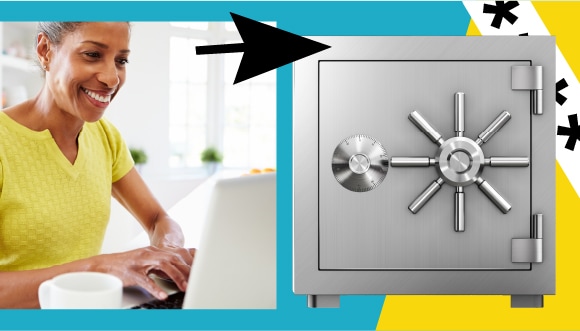Connecting online has never been easier. You can talk to your grandchild across the country, buy things from around the world or play games with your friends no matter where they are. But if you’re active online, you need to make sure that you’re being cyber secure with all your online activity.
Multi-factor authentication, VPN’s, network security, phishing…all these things can impact your cyber security. But being cyber safe doesn’t have to be as complicated as you think. Strong cyber security practices can help limit your screen time to what’s important. We’re here to help with a few simple things you can do to start making your online activity secure.
Protect your online activity
A breach of any of your accounts can have huge impacts, such as your identity being stolen by cyber criminals. The consequences can be even more serious if you’re using the same password for multiple accounts. If your password from one account is stolen, someone can then use it to access any of your other accounts that also use that password. Having strong and unique passwords for each of your accounts can help keep your information safe.
If you’re having a hard time keeping all your accounts and passwords organized, a password manager can remember your login information and keep it secure. Some password managers can even help you generate strong and unique passwords for each account and have handy auto-fill options. However, even though it may be convenient, we don’t recommend that you use the auto-fill options within your web browser or on your mobile phone.
It’s also important to run software updates regularly to keep your devices and applications secure. A great way to do this is to enable automatic updates for all your software. Automatic updates do exactly what the name suggests: they install updates on your devices and software as soon as they become available. This ensures your software has the latest protections in place. Once you turn automatic updates on, you won’t have to worry about them anymore and you’ll stop receiving those pesky notifications.
Watch out for scams
Online scams try to steal your personal data. These scams often look like they come from an official source, such as Netflix, the Canada Revenue Agency or even someone you know personally. It’s important to know the signs and watch out for them, so you don’t fall victim to an online scam.
Keep an eye out for the red flags of a phishing scam, like a misspelled email address or threatening language in the email body. Phishing scams, a common type of cyber crime, are cleverly designed to trick victims into revealing information they otherwise wouldn’t, like credit card numbers and passwords. If anything seems off in an email, link or website, it’s best to double check and make sure it’s legitimate. You can verify the email’s sender through the contact information on their official website instead of clicking on it in the email.
Install anti-virus software
You can use some cyber security tools, like automatic updates, to put your mind at ease and protect your data. Anti-virus software is another tool that you can install to help keep your online activity safe. Anti-virus software scans your device for viruses and harmful malware.
When downloading and installing anti-virus software, you need to make sure that it comes from a legitimate and reputable source. Scammers will try to trick you into believing you’re downloading anti-virus software when it’s really a virus that will infect your computer. Never click on any ads or links that offer anti-virus software for free, and never download anything unless you know it’s safe. It’s best to do some research to find the right software for you and then go directly to the vendor’s website to download it. Once you’ve installed anti-virus software and enabled automatic updates, you can rest a little easier knowing that your online activity is more secure.
Conclusion
Being active online means there’s lots to explore and discover. While you’re enjoying everything the internet offers, it’s important to browse safely and make cyber security part of your online activity. This may seem like a big task, but the simple cyber security tips described above make a difference, will help protect you online and will ensure your personal data is safe. And you can get back to spending your time online doing the things you enjoy.